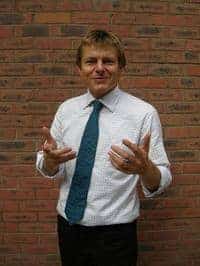 Author information: Matthew Thomson has been chief executive of London CRN for just over a year, bringing over ten years community and social enterprise experience to the re-use, composting and recycling sector. The London network comprises over 200 organisations working in the green economy, public service delivery, regeneration and community engagement.
Author information: Matthew Thomson has been chief executive of London CRN for just over a year, bringing over ten years community and social enterprise experience to the re-use, composting and recycling sector. The London network comprises over 200 organisations working in the green economy, public service delivery, regeneration and community engagement. At the beginning of the month the minister for housing and planning, Caroline Flint, published the government's eco-town prospectus. Ten new eco-towns are intended across England, with the construction of the first schemes planned to start in 2010, and fifteen proposals short-listed so far. Big commitments are being made to zero-carbon development, environmental sensitivity, highest possible quality and radical innovation. Urban designers, architects, planners and a myriad consultants, officials, and wonks are now wrestling with the application of sustainability in practice as never before. A huge adventure in social engineering as much as it is in sustainable design, the eco-town programme gives our sector unprecedented opportunities to transform the way the English manage resources – it's time for resource management professionals to get with the programme.
“Eco-towns will need to be leaders on minimising and recycling and extracting value from waste”, states the prospectus. While resource efficiency is seen as a key driver for the ‘eco-ness' of these settlements, waste is described very much in end-of-pipe terms in the prospectus, calling for:
• state of the art on-site provision for storage, collection, sorting and recycling of waste from homes and businesses;
• waste strategies linked to energy provision;
• zero construction waste to landfill through the effective use of recycled materials;
• any waste sent off-site for treatment to be balanced by the use of recycled materials in construction.
There is no reference to the waste hierarchy, reuse is not mentioned at all, and no steer is given on design solutions to waste minimization. Defra's head of Waste Policy and Processes, David Mottershead, observed some time ago that waste management is as much a communications business as it is a logistics business. Behaviour change is therefore the new frontier for many resource managers. But it needn't be left to community engagement and politicking to get people to do things differently – design can have a massive effect. University of Southampton research published in December found that shorter streets increase the level of participation in recycling, and that streets designed to increase social interaction can reduce waste too.
Whether it's about Building Materials Reuse Centres, quality-focused Reuse and Recycling Centres, decentralised community composting facilities, or about better buildings, estates and streets which make collections easier and minimize waste-miles, we must now contribute to the eco-town debate to make sure these settlements are as resource efficient as they can be. It's time for us to get creative, think laterally and engage with design professionals to help them find ways of making our jobs easier. If we find ourselves having to deal with the same barriers in the eco-towns that jade us in many current settings, we'll have no-one to blame but ourselves.










Subscribe for free